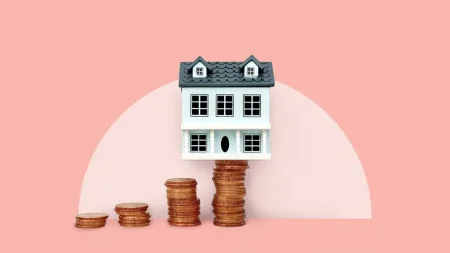Jimmy Fuentes knows what it takes to buy a home. A licensed mortgage broker and a homeowner himself, Fuentes advises his clientele of real estate investors daily on all aspects of property ownership. But recently, he’s hit a wall when it comes to rising insurance premiums. “I am frustrated,” says Fuentes. “I have been forced to advise some clients to abandon great homes due to the fact that the insurance premiums killed the figures.” Fuentes is facing a similar problem with his own home, where his insurance bill keeps going up despite not filing a claim or experiencing a coverage lapse. “The premium then increased more than threefold without any explanation.”
Fuentes’ story isn’t an uncommon one. Nearly half of homeowners insurance policyholders saw their rates go up in the past year. Average home insurance costs rose more than 9 percent from 2023 to 2025, according to Bankrate’s Home Insurance Affordability Ranking. That’s faster than overall inflation over the same time period. In some areas of the country, rate increases averaged more than 40 percent. For Fuentes, the rate increases have made him “doubt whether we have bought anything here.”
Bankrate’s 2025 Home Affordability Report found that of homeowners who have at least one regret about buying their current home, the most common is that maintenance and other hidden costs were more expensive than expected, cited by 42 percent of homeowners.
Insurance takes center stage in home deals
Buying home insurance used to be something of an afterthought in the buying process. Now, it’s front of mind for many potential buyers, especially in hard-hit states like California, Florida, Texas and Louisiana. “Insurance was never really thought of to be one of the first things to think of,” Michelle Perry, the president of the Santa Clara County Association of Realtors, told NBC Bay Area. “Sometimes it’s even better to look for insurance prior to even making the offer.”
Insurance is a non-negotiable part of many mortgages; failing to secure an affordable policy can cause the real estate transaction to fall apart. “If you think about what causes housing affordability, the biggest factor is the price of the home, the second biggest is the cost of the mortgage, and then, depending on where you live, the third will either be insurance or property taxes, or vice versa,” says Sean Harper, CEO of Kin Insurance.
Why is home insurance so hard to get?
The increasing cost and shrinking availability of home insurance are largely spurred by extreme weather events. When a wildfire, tornado, hurricane or other covered weather event damages a swath of houses, insurance companies are contractually obligated to pay out those losses, which add up fast. In 2024, hurricanes, storms and other natural disasters caused an estimated $140 billion in insured losses globally, according to reinsurance company Munich Re, with hurricanes Milton and Helene as the two most expensive events worldwide. This is up from 2023’s total losses of $106 billion and the third most expensive year since 1980.
When it becomes too expensive to insure homes in a particular area, insurance companies have two options: raise rates or limit the number of new policies they take on. In some cases, insurance companies have no option but to pull out of a state entirely to protect their profit margins.
One record-breaking high after another — the consequences are devastating. The destructive forces of climate change are becoming increasingly evident.
— Thomas Blunck
Member, Munich Re’s management board
The impact of insurance on home values
The home insurance crisis has adverse effects on home values. When insurance companies pull out of certain states, creating what’s been dubbed “insurance deserts,” rates go up, and buyers may begin to avoid high-risk areas. These three factors combined are expected to cause a $1.47 trillion decline in U.S. home values by 2055, according to a report from climate research firm First Street.
A home is more than just four walls and a roof — owning a home can be a major financial advantage. You could sell it for a profit, leverage the equity and boost your net worth. “Homes are usually a good investment; they have been for the last 100 years,” says Harper. “But, not every home is a good investment.”
How to find an insurable home
Homeowners across the country have been feeling the sting of higher premiums and fewer insurance options. “[The home insurance market] has been performing poorly as of late….especially considering what part of the country you live in,” says Sean Kent, senior vice president at FirstService Financial. “It’s been painful for a lot of consumers.”
The causes of the home insurance crisis are, for the most part, out of homeowners’ hands. But, there are a couple of things current and would-be homeowners can do to hang onto their policies and keep premiums manageable.
Shop for a policy before you buy a home
Insurance can no longer be an afterthought in the homebuying process; prospective homeowners need to make finding insurance an early step. If you’re serious about a potential home, consider contacting a licensed insurance broker or independent agent. They partner with multiple insurance companies and can help you determine which companies operate in your area and which ones can offer the coverage you need.
Think carefully about claims
Filing a claim for covered damage is what insurance is designed for, but it can also signal risk to your insurer, especially if you live in a high-risk market. That’s not to say you should never file a claim; rather, you should be strategic about when you do so. You might want to pay for smaller damages out of pocket or consider an alternative method of financing home repairs. See if you can leverage your home’s equity to finance repairs, or consider taking out a personal loan.
Raise your deductible — but only if you can afford to
Going from a $1,000 to $5,000 deductible shaved an average of $463 per year off your home insurance bill, according to Bankrate’s Home Insurance Affordability Ranking. Raising your deductible can be an effective way to manage high home insurance costs, but only raise your deductible to an amount you can actually afford to pay out of pocket. Going into debt to pay your deductible can have an adverse effect on your home insurance costs in the long run, as credit is a major rating factor. Going from the “good” to “poor” credit tier raised home insurance costs by an average of 63 percent, or an extra $1,557 per year.
Tailor your policy with a licensed professional
Crafting a home insurance policy can be daunting, but you don’t need to do it entirely on your own. A licensed insurance agent or broker can help you balance affordability and coverage. Working with a professional can also help take some of the guesswork out of what you can self-insure and what should be covered by your home insurance policy.
The bottom line
Despite the escalating challenges of buying a home, the allure of owning where you live hasn’t waned. Bankrate’s Home Affordability Report found that 82 percent of Americans say owning a home is part of the American Dream — more than retirement or having a successful career.
While Jimmy Fuentes, the homeowner we spoke to earlier, isn’t thrilled with his higher home insurance costs, he still believes in property ownership as a whole. “I do not hate the house, but I hate it not being predictable, being caught between the rocks,” he says. “That part really stings.”
Why we ask for feedback
Your feedback helps us improve our content and services. It takes less than a minute to
complete.
Your responses are anonymous and will only be used for improving our website.
Help us improve our content
Read the full article here









